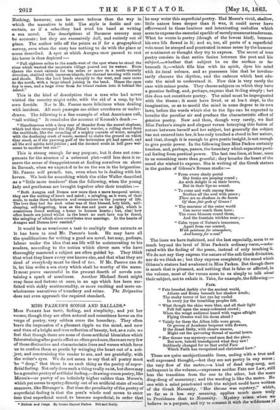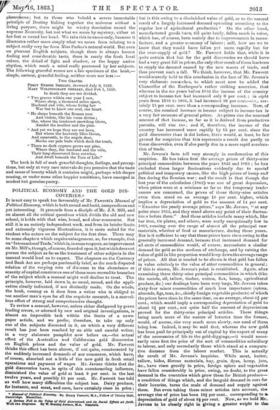MISS PAAKES'S SONGS AND BALLADS.*
Miss PAEKES has taste, feeling, and simplicity, and yet her verses, though they are often natural and sometimes hover on the verge of poetry, very seldom cross the boundary. They often leave the impression of a pleasant ripple on the mind, and now and then of a bright and true reflection of beauty, but, as a rule, we feel that though there are none of those artificial blemishes which false straining after poetic effect so often produces, there are very few cf those distinctive and characteristic lines and verses which force in to confess them as poetic by wringing the heart out of a sub- ject, and constraining the reader to see, and see gratefully, with the writer's eyes. We do not mean to say that all poetry must 'be "deep," that there is no such thing as the poetry of super- ficial feeling. Not only does such a thing really exist, but there may le a genuine poetry of artificial feeling,—drawing-room poetry, like Moore's—or poetry of au infinitely higher calibre than Moore's, which yet seems to spring directly out of an artificial state of social manners, like Beranger's. But then the peculiarity of the poetry of superficial feeling is that the poet's whole soul seems to enter into that superficial mood, to become superficial, in order that
* Ballads and Longs. By Bessie Rayner Parkes. Bell and Daldy.
he may write this superficial poetry. Had Moore's vivid, shallow, little nature been deeper than it was, it could never have effervesced in those luscious and intoxicating melodies which seem to express the essential sparkle of merely sensuous tenderness. What he wrote is poetry (though of the lowest kind), because his own life flowed in it; and so, too, all poets of a superficial vein must be steeped and penetrated in some sense by the humour or sentiment or thought they try to express. The secret of true poetry consists in that entire fusion between the poet and his subject,--whether that subject be on the surface or far beneath it,—which fills him with its spirit, dyes his mind with its local colours, and so possesses him that he involun- tarily chooses the rhythm, and the cadence which best edu- cate the mind to understand it. Now this is very rarely the case with minor poets. They choose subjects on which they have a genuine feeling, and, perhaps, express that feeling simply ; but this does not constitute poetry. The mind must be impregnated with the theme ; it must have lived, or at lea-t slept, in the imagination, so as to mould the mind in some degree to its own laws, before the words which rise to the lips can be expected to breathe the peculiar air and produce the characteristic effect of genuine poetry. Now and then, though very rarely, we find Miss Parkes's simple and elegant verses betraying this fusion of nature between herself and her subject, but generally the subject has not entered into her, it has only touched a chord in her nature, and that, though it is enough to give poetic insight, is not enough to give poetic power. In the following lines Miss Parkes certainly touches, and, perhaps, passes, the boundary which separates poeti- cal feeling from poetical power. The last two lines, at least, seem to us something more than graceful ; they breathe the heart of the mood she wished to express. She is writing of the Greek statues in the garden of Gibson's Roman studio:—
" From every shady portal
Shy forms are peeping round ; An arch delight is on their brows, But in their lips no sound.
"To come and walk among them Soothes all the soul with peace ; There are no shadows in time hearts Of these fair gods of Greece!
"The murmur of the outer world Can never reach them here; The roses blossom round them, And the fountain trickles near ;— " Calm types of Nature's innocence, Apart from our control, With quietness for atmosphere, And beauty for a soul."
The lines we have italicized, and the last especially, seem to us much beyond the level of Miss Parkes's ordinary verse,—satu- rated with the feeling of the poem, instead of only touching it. We do not say they express the nature of the soft Greek divinities, nor do we think so ; but they express completely the mood which Gibson's statues had awakened in Miss Parkes. But though there is much that is pleasant, and nothing that is false or affected, in the volume, most of the verses seem to us simply to talk about their subject, not to exhale it. Take, for example,the following:—
Fars.
"Fate brooded darkly o'er the ancient world, Athens and Rome beneath her shadow dwelt ; The snaky terror of her eye lay curled In every joy the trembling peoples felt.
"What though the skies were blue, and all their light Fell full upon the many-coloured crowd ;
When the wrapt audience heard with vague affright Flying Orestes wail his doom aloud ?
"Vainly for them the Alban hills were green, Or groves of Academe besprent with flowers, If the dread Deity, with shears unseen, Might cut the quivering thread of mortal hours.
"Her throne was mystery—and men fled the place, But now, behold transfigured what they saw! Sublimely changed for us that awful Face
Which Faith has recognized and christened Law."
Those are quite unobjectionable lines, ending with a true and well expressed thought,—but they are not poetry in any sense ; the very flow of the metre,—a kind of dead sing-song, not unfrequent in the volume,—expresses neither Fate nor Law, still less the transition from the one to the other, but the mere ding-dong of monotony; and the wording is like the metre. No one with a mind penetrated with the subject could have written of the Greek Necessity, "Her throne was mystery," which, so far as it has any meaning, applies much more truly to Providence than to- Necessity. Mystery arises when we believe in a purpose, and try to connect it with the wilderness of phen4entt; but to those who behold a severe immutable prin6iple of Destiny linking together the universe without a living purpose, there might be wintry desolation round the supreme Necessity, but not what we mean by mystery, either at her feet or round her head. We take this instance only, because it illustrates rather more simply what we mean from relating to a subject really very far from Miss Parkes's natural world. But even on pleasant English subjects, though there is always honest feeling and considerable taste, there is rarely the fresh local colour, the detail of light and shadow, or the happy native rhythm, which mark a mind really possessed by her subjects. The following graceful verses are a fair specimen of the book,— simple, earnest, graceful feeling, neither more nor leas :— Two GRAVES.
PERCY BYSSHE SHELLEY, drowned July 8, 1822. MARY WOLSTONCRAFT SHELLEY, died Feb 1, 1851.
In death they are not divided.
"Two graves -within one year I saw,
Where sleep, a thousand miles apart, Husband and wife, whose living law
Was but to know one soul, one heart.
"He sleeps beneath the Roman rose And violets, like his verse divine ; She, where the tenderest snowdrop blows, Amidst the heather and the pine.
"And yet we hope they are not here, But where the heavenly lilies bloom, And amaranth, to the angels dear, Mocks our pale buds which deck the tomb.
"There no dark cypress grows nor pine, Where they, the husband and the wife, Their long-dissevered lives entwine, And dwell beneath the Tree of Life."
The book is full of such graceful thoughts, feelings, and percep- tions, but only at very rare intervals do you perceive that the taste and sense of beauty which it contains might, perhaps with deeper musing, or under some other happier conditions, have emerged in modest but genuine poetry.































 Previous page
Previous page